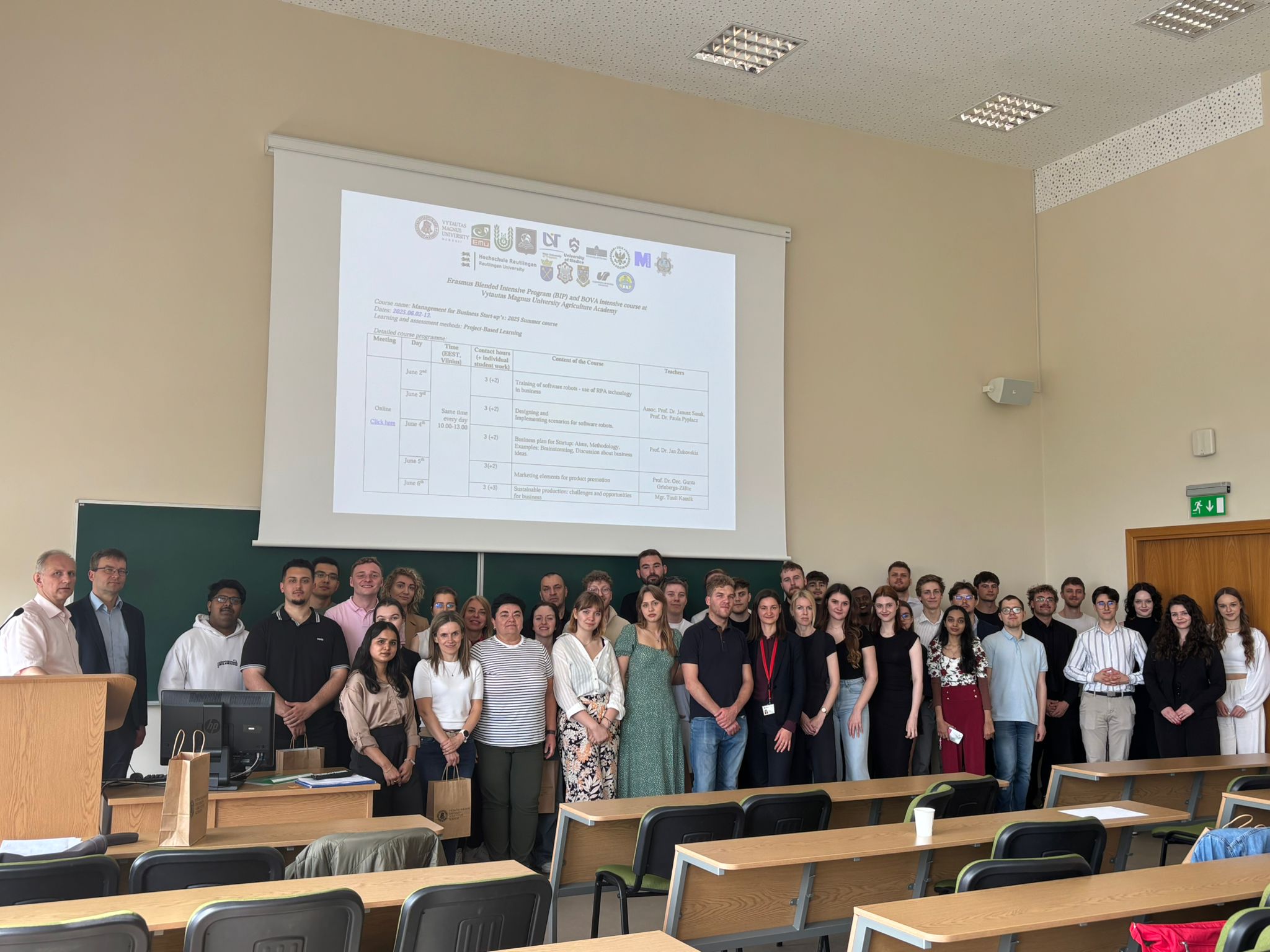Empowering Young Entrepreneurs: Erasmus+ BIP “Management for Business Startups” at VMU Agriculture Academy

Vytautas Magnus University Agriculture Academy (VMU AA) in Kaunas, Lithuania, recently hosted a dynamic and multicultural Erasmus+ Blended Intensive Programme (BIP) titled “Management for Business Startups – 2025 Summer Course.” Taking place from June 2 to 13, 2025, the programme was designed to provide both bachelor’s and master’s students with essential entrepreneurial skills and tools to develop, plan, and present their own business ideas. The blended format combined online instruction with on-site mobility in Lithuania, enabling students to engage across borders while gaining practical insights into startup creation and business modelling. Awarding 3 ECTS credits, the course brought together a vibrant group of participants from Estonia, Greece, Germany, India, Kazakhstan, Mauritius, Poland, Romania, Sierra Leone, Slovenia, and Ukraine, creating a truly global learning environment. This BIP course emphasized experiential learning, intercultural exchange, and collaborative project work, making it a valuable platform for fostering entrepreneurial thinking within a European and international framework.
Blended Format: Virtual Knowledge Meets Real-World Practice
The course followed a thoughtfully structured approach. During the first week, participants joined virtual sessions exploring the use of robotic process automation (RPA) in business, designing software automation scenarios, and tackling themes such as sustainable production, marketing strategy, and business development frameworks. These sessions laid the groundwork for the hands-on collaboration and final project preparation that followed.
Academic Engagement in an International Environment
The second week unfolded on-site in Kaunas, where students gathered for in-person workshops focused on business modeling, financial planning, budgeting, and marketing tactics. Each day introduced new elements vital to startup success. The academic sessions were led by an accomplished international teaching team, including Prof. Dr. Jan Žukovskis (VMU), Prof. Dr. Gunta Grīnberga-Zālīte (Latvia), Prof. Dr. Paula Pyplacz (Poland), Assoc. Prof. Dr. Janusz Sasak (Poland), and Mgr. Tuuli Kaasik (Estonia). Prof. Dorota Chudy-Hyski from the University of Silesia in Katowice and Karolina Hyski from the University of Economics in Katowice participated in the project evaluation process, providing professional feedback and contributing to the academic integrity and practical relevance of the student startup ideas. Alongside the educational programme, students toured Kaunas Old Town, visited Vilnius, and enjoyed excursions through VMU’s picturesque Agriculture Academy campus. Evening activities and informal gatherings deepened connections between participants and added cultural richness to the academic experience.
A Diverse and Multidisciplinary Cohort
The programme brought together thirty-six students from eleven countries and sixteen partner universities. Participants represented a wide spectrum of academic disciplines including agriculture, environmental science, economics, marketing, logistics, and digital business. Their international and interdisciplinary collaboration led to a vibrant and idea-rich learning environment where new business concepts were born and developed.
Pitching Startup Ideas with Confidence
Throughout the week, students worked in teams to refine business ideas, build budget plans, and prepare pitches. The final day featured formal presentations before a panel of lecturers and peers simulating investor discussions. These sessions not only tested participants’ ability to communicate and justify their concepts, but also celebrated their innovation, teamwork, and leadership skills. Each student was awarded a certificate recognizing their academic and collaborative achievements.
Reflections from Participants
Feedback gathered after the programme revealed a high level of satisfaction. Nearly all participants rated the course as excellent or very good. They especially appreciated the interactive format, the practical orientation of the course content, and the supportive international atmosphere. Students distinguished the academic quality of the lectures, the professionalism of the faculty, and the chance to apply theory in real-world-inspired settings. Suggestions included adding even more time for face-to-face learning and expanding future sessions to include advanced startup simulations.
Looking Ahead: A Model of Entrepreneurial Education
The 2025 Management for Business Startups BIP stands as a testament to VMU Agriculture Academy’s commitment to advancing entrepreneurship education through international cooperation and innovative teaching methods. It equipped students with essential business competencies, boosted their confidence, and built lasting cross-border connections that will carry into future professional ventures.
Erasmus BIP partner universities: Akhmet Baitursynuly Kostanay Regional University , Almaty Management University, Czestochowa University of Technology, Estonian University of Life Sciences, Jagiellonian University, Latvia University of Life Sciences and Technologies, Military University of Technology, Reutlingen University, University of Maribor, University of Mauritius, University of Oradea, University of Siedlce, University of Silesia in Katowice, Warsaw University of Life Sciences.
Prepared by dr. Monika Medikienė (International Coordinator of VMU AA) and prof. dr. Jan Žukovskis (Faculty of Bioeconomy Development).
Co-Funded by the European Union. Views and opinions expressed are however those of the author(s) only and do not necessarily reflect those of the European Union or the European Education and Culture Executive Agency (EACEA). Neither the European Union nor EACEA can be held responsible for them.













